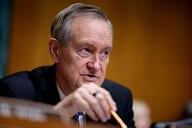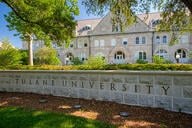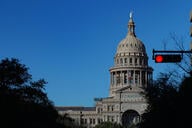You have /5 articles left.
Sign up for a free account or log in.
Middlebury College has announced that an additional 19 students -- beyond those already punished -- have received sanctions for their role in disrupting a March lecture on campus by Charles Murray, the controversial social scientist.
The college, meanwhile, continues to face criticism both that it hasn't punished students harshly enough (although details of the punishments haven't been released) and that it shouldn't be punishing the students at all.
On March 2, Murray was unable to give his scheduled speech as dozens of students stood, shouted and chanted to prevent him from being heard. Murray was then moved to another location to give his talk and take some questions via video. When he left that event, a Middlebury professor who had been recruited to ask Murray questions was physically attacked, and some jumped on a car carrying Murray and the professor. The college has suggested that some of those involved in the latter activities were not students.
The Middlebury incident has become something of a Rorschach test for how one views free speech issues in higher education. To some, Murray never should have been invited. To others Murray's views (considered racist by many) are irrelevant, and the protests reflect students' intolerance of views with which they disagree.
Ever since March 2, conservative websites have been predicting that there would be no punishments -- a claim that no longer seems viable. But that doesn't mean people aren't debating what the college has done (or the limited information it has released). The college has said that federal and college privacy rules limit what officials can say about the punishments. College officials have said that disrupting the speech itself violated the college's rules, but that some of the subsequent activities (including the attack on the professor) represent more serious offenses.
Last month, Middlebury announced that more than 30 students had been punished for activities that were limited to disrupting the lecture. In a new announcement, the college says that group numbered 41, and that an additional 19 students have now been punished. The new statement did not detail how those students have been punished but said that a campus judicial board determined that "the second stage of the protest behaviors merited stronger sanctions."
More disciplinary hearings should be concluded soon, the statement said. Middlebury has said that a total of around 70 students have been identified as having possibly violated college rules in the protests, which were widely filmed by participants and others and posted on social media.
Statements of Faculty Concern
Middlebury has announced the creation of a new faculty committee to help consider the issues raised by the protest against Murray. And the disruption of the lecture has prompted numerous faculty members and students nationally to speak out in favor of the values of free expression on campus.
At the same time, some faculty members (some of them from far away from Middlebury) are speaking out against punishments of the students.
An open letter from faculty members nationally (also joined by some Middlebury students) urged the college to halt punishment of students. The letter notes that there are multiple narratives of what happened the night of the Murray lecture. But regardless, the letter says students shouldn't be held responsible for the way they reacted to Murray.
"The responsibility for what happened at Middlebury cannot be placed exclusively or even primarily on the shoulders of students who are now being disciplined," the letter says. "The administration, faculty and other members of the college community who invited, enabled and formally welcomed so dangerous a figure as Murray in full knowledge of his history bear responsibility, as does the Middlebury administration for then overriding objections leading up to his lecture, and disrespecting students’, faculty, and alumni concerns."
In addition, a group of more than 40 Middlebury faculty members published in The Middlebury Campus, the student newspaper, an "initial statement on the principles of inclusivity, civil freedoms and community."
The statement affirms the value of freedom expression, saying, "Freedom of speech and freedom of inquiry are central to our educational mission, and we must robustly protect those freedoms for all students, staff and faculty." But the statement also suggests (without naming Murray) that part of the problem was that he was invited in the first place. The statement calls for support for nonviolent civil disobedience (which might apply to the first part of the Murray protest).
"Because freedom of speech and a culture of inclusivity are mutually imbricated values, such freedom comes with the obligation that it be exercised responsibly, especially when offering the platform of our campus to outside speakers who may undermine our culture of inclusivity -- symbolically or otherwise," the open letter says. "Thus, we all have the right and the responsibility to challenge any form of hateful speech at our institution, through a critique that examines its source, intent, financing and impact on members of our community. We agree that the purpose of higher education is not to make anyone comfortable in their opinions and prejudices. But speech that justifies, naturalizes and reinforces the positions of the privileged vis-à-vis the marginalized should be rigorously scrutinized and critiqued, and speech that challenges such opinions and prejudices should be encouraged."
The letter adds, "We recognize that sometimes the values of inclusivity and justice come into direct conflict with other core values of our community or challenge established rules and policies. In moments of such conflict, members of our community may choose to engage in nonviolent civil disobedience. Disruptive as it may seem, civil disobedience is often constructive as a necessary means to reorganize and redefine the values and relationships that make up a community."




